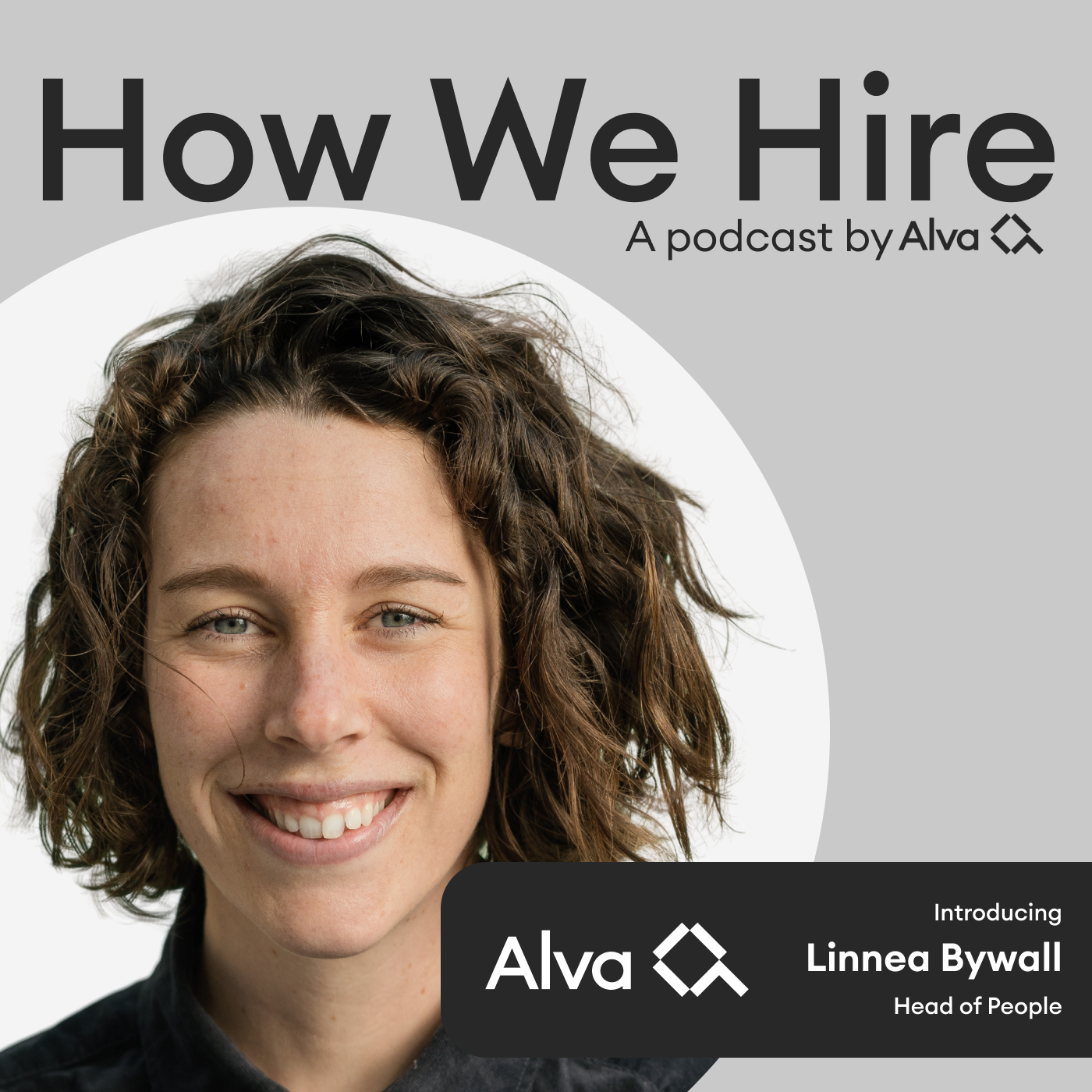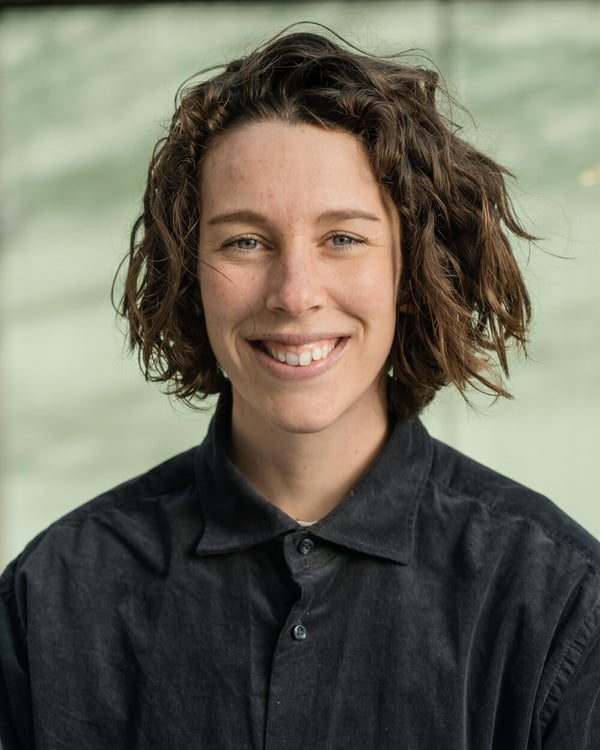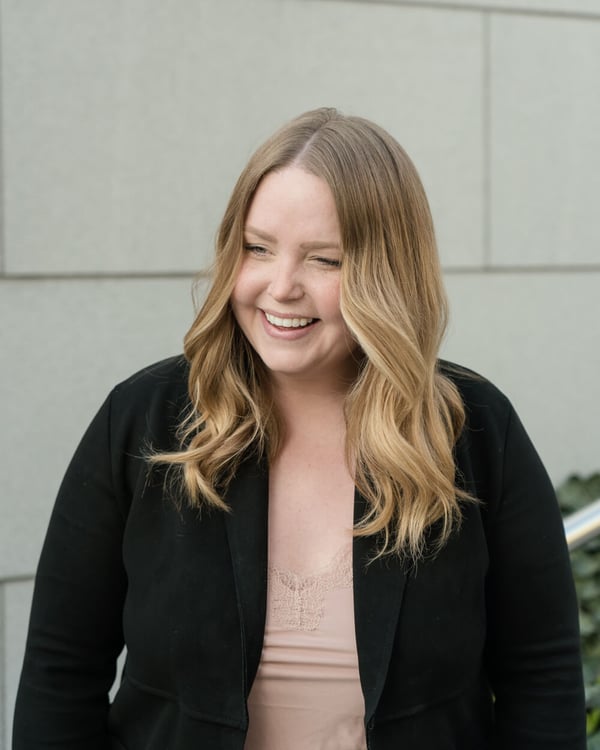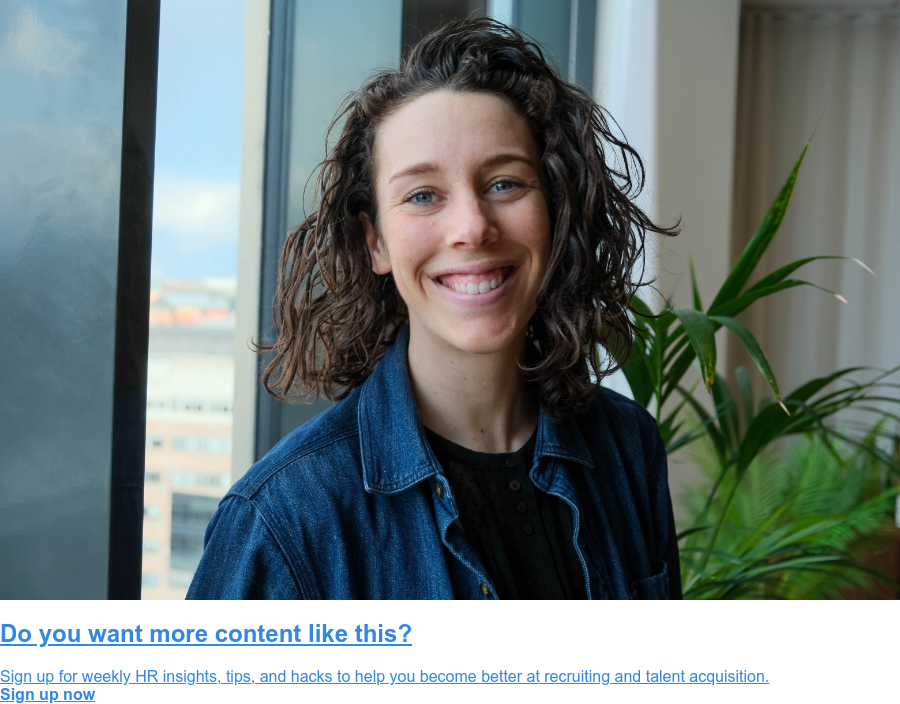How We Hire: Episode one transcript
Tove Hernlund (00:06): Welcome to How We Hire, a podcast by Alva Labs with me, Tove Hernlund.
Linnea Bywall (00:11): And me, Linnea Bywall.
Tove Hernlund (00:12): This show is for all of you who hire or just find recruitment interesting. Every episode, we will speak with thought leaders from across the globe to learn from their experiences and best practice within hiring, building teams, and growing organizations. Hi everyone, and welcome to the very first episode of How We Hire, with me Tove.
Linnea Bywall (00:36): And me, Linnea.
Tove Hernlund (00:38): Yay. Going forward, we'll interview lots of exciting guests from various type of companies and find out how they hire, but in this very first episode, I think it's really time for us to dig a little bit deeper into who you are, Linnea, and how you hire. Tell us a little bit about yourself. What do you do? Why are you so passionate about this?
Linnea Bywall (00:59): I will have to deal with this first one.
Tove Hernlund (01:01): Yes.
Linnea Bywall (01:01): No. My name is Linnea. I am the head of people here at Alva. I have a background as, I'm a licensed psychologist. I started working as a psychologist a couple of years ago, but never really worked as a traditional psychologist. Well, secret, I'm terrible at listening. I'm a lot better at talking. It was a lot easier to take the organizational psychology route rather than the traditional clinical one.
Since start, I've actually worked in some way or form with either recruitment or leadership development. Super passionate about both those things, understanding and predicting who's a good hire, but also how to grow that person, I guess. Since three years now, three years back, I have been at Alba Labs, just started my fourth year here and [inaudible 00:01:56].
Tove Hernlund (01:56): Yes, that's crazy. I'm on the same journey in terms of how many years I've been here, which is exciting. We're following each other along, which is nice. Linnea, what do you do at Alva? Why do you find it so fun to wake up and go to work each morning?
Linnea Bywall (02:10): What don't I do? I have a really broad role here. When I started, I was number 14 and today we are a bit over 80 people, but my role is obviously everything HR related, so attracting great people, hiring great people, onboarding great people, growing those individuals, making sure that we can retain our great employees, but also supporting managers in leadership development, setting targets, and helping them grow their teams.
I do a little bit of everything, which is why, as you say, I love waking up and going to work, because it's a very broad spectrum where I get to use my, I guess, psychology background a lot, but also where I get to have my fingers in a lot of cookie jars, which is super exciting. A lot of variety.
Tove Hernlund (03:04): Yeah, absolutely. I mean, coming in so early at a company growing that much over the past few years, do you think that you've had a lot of use of your psychology degree? I mean, as you said, you might have some use of it, but how much of that do you think have benefited you in your role?
Linnea Bywall (03:20): I mean, as a psychologist, the most important perspective is to some extent the individual. There's a lot of other professions that focus more on the system and stuff like that, the bigger organization, but I think it's going back to how can I understand and assess this individual and how can I make the most, for this person, how can I help them unleash their potential, has been really helpful.
I guess if you know a psychologist and you know how annoying it is when you ask them questions, because it's always like, well, it depends, is the traditional psychologist's answer, but I think that has actually helped in understanding that it's never black and white. It's always a bunch of different scenarios, a bunch of different factors that impact why people do what they do and how they behave and why things work the way they do. I think that has helped me keep my sanity maybe in everything, how quickly things change and just have some understanding of people's reactions to those, the fast paced growth.
Tove Hernlund (04:32): I mean, in terms of coming in early, you were a big part of setting the recruitment process, but how have that changed?
Linnea Bywall (04:40): I think this was the unique situation of being nerdy about recruitment in a company that actually works with recruitment. The major building blocks were there, but of course things have changed a lot. I think if I'm going to share my darkest secret-
Linnea Bywall (05:00): I have more of them, but one dark secret that I have is that how actually afraid I was to take on this role, because I don't have technically an HR background, I know bits and pieces of it, but not everything, far from it, but it was scary going in. Okay. The area that I know the most is actually recruitment and everyone else is also really, really have a lot of knowledge and understanding for it. I was worried what can I actually contribute with? But from when I started, we had some stuff in place.
We had some tech in place. We had an applicant tracking system, we obviously had our own assessment tool. We had decent interviews, using structured interviews. We already used some shape or form of a work sample test.
Linnea Bywall (05:47): But it was obviously when we were not very well known, we didn't have a strong employer brand or anything like that, and we didn't hire at scale. I mean, early on, it's very common that you hire from your network and I think that was to some extent what happened, but also there was a lot of the major building blocks already in place that has now been fine-tuned and of course shaped in a way that we can now do it in a more scalable way, so it doesn't live in someone's head. I think we have done minor adjustments along the way, which has now landed in a decent looking process that I'm actually pretty proud of.
Tove Hernlund (06:29): Is there anything, I mean, obviously with the bigger building blocks being in place and it sounds like there was a really good process in place and it comes naturally with a company that focuses on recruitment, I guess. But was there anything, looking back, that you would've done differently in terms of implementing the updates that you did do?
Linnea Bywall (06:49): I think now looking back, the biggest change I would've made was to way, way earlier put down on paper or digital paper at least, a talent strategy. Meaning, knowing, okay, what type of company do we want to build? What type of people do we want to hire?
What do we want to optimize for? Because I think there have been a lot of discussions along the way like, is this the right type of demands for this role? Is this the right type of candidate? Are we expecting the right things? That could have been so much smoother if we had spelled out what we prioritized. Because I mean, it's always going to be, you can't have everything, you're going to have to choose what's most important early on in a startup journey.
Linnea Bywall (07:39): The generalist will be way more important because you need people that can grow with the organization that have super high potentials, but that can do a wide variety of tasks. Then where we are now, we need more specialists that are more experts in their field and so forth. But I think just having that outspoken would've been a lot easier. That is probably the thing that I would change most quickly or rapidly if I would've done this journey again.
Tove Hernlund (08:10): Having a talent strategy, is that something that you see a lot of companies having or is that something that in general might be lacking in different organizations?
Linnea Bywall (08:20): I honestly don't know. I think some do. I think most organizations probably have a vague sense of it. I think it's probably something that if you have a larger recruitment team, you probably have more of that because you need to. As soon as you are more people that need to do the same stuff in a somewhat similar way, you need some guiding principles and I think this is one way. But I think this is rarely spoken of to be honest, or maybe I just haven't heard it that much, but I think more companies would benefit from just understanding what is it that we prioritize. Take as an example, we obviously value diversity, which a lot of companies do.
Linnea Bywall (09:07): The way that we have tried to actually live by that is that we have English as our internal language. Meaning, we can hire anyone from anywhere that speaks English. We don't have a language limitation, which based on my experience, a lot of companies don't dare to go there.
They prefer to stick to their native tongue because it gets slightly uncomfortable in the lunchroom if you have to switch. That's one thing. Also, the fact that we work hybrid, so you can work remotely if you want to. Meaning again, we can hire from all over the world. It sounds easy in theory, but that comes with a lot of challenges, legal challenges, but also how do you create asynchronous work in a way that actually is helpful? How do you create engagement and culture and stuff like that?
Linnea Bywall (09:55): I think if you want diversity, you probably have to decide on some things that will increase that, which means that you will have other stuff that will be harder. You can't have a diverse team if you demand a specific language, a specific town that you have to live in, et cetera, et cetera. Just having that spelled out also means that, okay, then we know that if we hire, we could hire talent globally, either hire them remotely or actually bring them here if they, and relocate people and we can invest time and effort in that. Just having that as a actual strategy has been helpful now that we have it.
Tove Hernlund (10:36): Yeah. It sounds like something a lot of other companies, I'm thinking that companies might get too focused on one individual role at a time, rather than seeing the bigger picture in terms of the talent that they might need, the talent that they might be in need of in six months, et cetera. Is that something that you also see rings through or is that way off? What would you say?
Linnea Bywall (11:00): No, I think that's a really good point. I mean, given it is so much easier to focus on the short-term perspective. I need a developer tomorrow that knows how to write code in this specific language. That means I'm not interested in hiring someone that needs to relearn, even if that might not take that long, but it's so much more important for me to solve my immediate problem. I think it's hard to live by a strategy A, if you don't have one, but B also because the immediate needs of each individual, like hiring manager will to some extent impact what they want to focus on. Also, I mean the other way around, sometimes you find one candidate that you really, really love that maybe actually doesn't really fit the role, but you like that person so much, you might start bending the rules a little bit and well, maybe we do need this, but not that, that we decided upon.
Linnea Bywall (12:00): I think, it's a big issue that we forget the long-term perspective. The average time someone stays with the company ish is three years. That's probably going to decrease now, but that means, I mean, three years is to some extent a long time. It takes what, six to nine months to onboard depending on the role and then you have a lot of time left. It's really important that you strategically think through who you want to bring on board because it will definitely have a huge impact on the performance for that role, for that team, and the overall company.
Tove Hernlund (12:37): The strategic part of recruitment is obviously something that you're very passionate about as well.
Linnea Bywall (12:41): It turned out to be somewhat of a hobby, yes. Hobby I tend to work with. Yeah.
Tove Hernlund (12:46): We talked a little bit about how the process has changed over time, but in this new reality that we're facing right now in terms of scarcity of candidates, the great resignation, has that also changed the way you think about recruitment in your daily work?
Linnea Bywall (13:02): Yes and no. To be honest, we have not necessarily been that affected by the talent shortage. We have had up till now the luxury of having actually quite a lot of applications for a lot of roles. I mean, we obviously compete for the same engineers and the same designers and great sales people as everyone else. But thankfully, I don't really know how we did it, but thankfully we have had a lot of applicants. I think we are noticing that we have to be quicker.
There's no time to, because the candidates are always in other processes, so you need to be a lot faster and we need to be really trying to create a high level of engagement in the process. I think the way that we have tried to do so is by really reducing some of the elements in their hiring process.
Linnea Bywall (13:59): I mean, we have screening questions and psychometric assessments as the first step. Then we have a interview with a recruiter or me as the first, to some extent live interaction with the candidate. Then we move forward to a second interview with a hiring manager, and then we do a case. That's roughly speaking our process. It varies a little bit from role to role, but that is pretty much it. We have tried to limit any unnecessary, extra interviews. We rarely do reference checks just to try to squeeze the time as much as possible to not waste any of the candidate's time. That is one thing that I think is super important. Then as I said, the engagement and I think the one thing that we have had the best reactions to is that we have a step that's voluntary once you've conducted the assessments, you've met with me or one of the recruiters in our team.
Linnea Bywall (14:57): When you're waiting for the next step, the hiring manager interview, you get a link so you can book a 15 minute slot with one of the people in the team that you are hiring into so that you can actually, if you want again, schedule a session, discuss with the person that might be your future coworker to see how are things actually at this place. Because sometimes speaking to the manager can give you one view, but it's really helpful. I know that from speaking for myself and in my experience, when I have been in processes before I joined Alva, you really want to understand what it's like, and that has been really appreciated. If people like it, they can steal with pride.
Tove Hernlund (15:39): Absolutely. I think that's one thing that we hear a lot from candidates in terms of them appreciating that part of the process. In terms of recruitment in general, I mean there's a lot of changes happening, are there any specific trends that you're super excited about?
Linnea Bywall (15:55): I think two different things. The first one is probably how the power dynamics is to some extent shifting. Not that long ago, it was more the employer's market. They could pretty much name the terms and the candidates were supposed to just be thankful that they were even allowed to send in an application. That might have been the glory days for the recruiter, but I don't think that actually creates good outcomes for anyone. I think that the fact that the focus now on the candidate experience and that you need to actually adapt and do things on the candidate terms, I think that is a trend that is creating a way, way better recruitment process.
Linnea Bywall (16:40): Even if it's challenging for a lot of companies out there to find talent, I think it's also making us better as recruiters. We need to spend more time with sourcing, improving our ways of doing that. We need to be way more mindful of intent in every activity. We can't waste time in any way for the candidates, so we need to be way more mindful of how we design our process.
We need to do it with way more respect for the candidates. I think that's a trend I really like, and I think that we should not ever lose track of. The other one, I guess is, I mean, the process of digitalizing HR has been ongoing for quite some time. I think the next step is to some extent AI in everything, which is super trendy, but I think it's exciting of what can happen when we allow more artificial intelligence, more data driven processes, less human interaction actually be a part of the recruitment process.
Linnea Bywall (17:43): What we know is a current challenge is that the more traditional way of hiring with us screening CDs, us sitting in an interview where we use our gut feeling to decide who moves forward or not, that creates quite dramatically scary results in certain groups in the society being way further away from the job markets and having a lot harder to break into the job markets where we also know if we can take a little bit of the human interaction away from the game, that will actually level the playing field for the candidates and create a more fair and efficient process. I think what can digitalizing the process actually do is, I think it's super exciting to see what will happen there.
Tove Hernlund (18:36): Do you think that there will always be a role for the human recruiter in the process or do you think AI will at some point take over and it won't be necessary anymore to be involved in the process?
Linnea Bywall (18:50): Yeah. I think that's really interesting because from a strictly evidence-based perspective, it would probably be a more accurate decision if, the less human interaction we had, it would probably be more accurate, but I can guarantee that we will lose candidates. I can't remember, it was one larger company that tried out a fully digital process from start to finish and they saw a massive drop from candidates. No, I don't think that we will ever completely eliminate the recruiter. I think the recruiter role will probably change and being more of a salesperson to some extent, really converting candidates into the process, helping converting signed candidates into happy employees.
Linnea Bywall (19:34): But I think we want to spend the recruiter's time smarter than we are now. For instance, not screening CVs as a massive time consuming thing that really doesn't give any value, but rather send them out talking to candidates, evaluate them in the stages where it's relevant and also have, candidates are human that want to interact with humans to get them to understand what company is it that I'm working for. That's going to be a lot easier to do with people, to be honest, even if you can automate that too, you probably can't do it fully. Not yet, at least.
Tove Hernlund (20:11): Not yet. Exactly. But I think that sounds promising then. Some additional help in terms of finding the right candidates, but also not eliminating the role of the recruiter and the personal interaction.
Linnea Bywall (20:24): Yeah.
Tove Hernlund (20:24): Do you have any types, I mean, you talked a little bit about gut feeling earlier and obviously the role of the recruiter. What you're saying now with AI is that AI can come in and not have that gut feeling, providing that it has the [inaudible 00:20:37] resources and data points behind it, of course.
Linnea Bywall (20:39): Yeah, yeah, yeah, yeah. Yeah. A major disclaimer AI.
Linnea Bywall (20:44): Not great stuff.
Tove Hernlund (20:45): No, exactly.
Linnea Bywall (20:45): Yeah.
Tove Hernlund (20:46): In terms of avoiding that gut feeling, do you have any other tips and tricks along the way that you want to share with other people who are facing hiring decisions right now or making hiring decisions and may or may not be relying a little too much on their gut feeling?
Linnea Bywall (21:01): I think the best way to put it is, or at least I think so is that, make sure that all candidates have the same experience and the same prerequisites. I think one of the more common mistake is that we treat each individual based upon what comes up in their interview.
We ask follow-up questions that are relevant only for them. We talk to references, digging into the issues that are only relevant for that specific candidates, which means that it's hard to compare apples and pears. If you talked about one thing with one candidate, and another with another candidate, it's going to be really, really difficult to compare who's the best to the best match for that specific roles. I think my pointer would be as much structure as possible, committing to a process before you actually engage in it, deciding beforehand what is it that we're going to do? How are we going to do that? What is it that the candidate will get to meet in each step?
Linnea Bywall (22:03): Deciding on what tools, in what order, what questions will we ask, how will we combine the different data points from the different assessment methods. I think having a structure and sticking to it is probably the most important thing. Just a follow-up point to my own suggestion is probably to start small. I think rather learning from agile ways of working, it doesn't have to be this massive, let's create a project and we're going to redesign our entire hiring process and let's shift it in six months from now. I would rather say try one thing in one process and see how that affects the outcome.
See how that reacts with the candidates, with hiring managers and so forth. Start small, I guess, and focus on one thing. Try one new interview question or try one new way of running reference checks or the list can be made long, but try small and evaluate what works for you. But structure is key.
Tove Hernlund (23:08): Structure is key. Yeah, absolutely. One more question before we round off this episode a little bit. Linnea, I also know that at Alva, you work a lot with retros for your recruitments that you do. Can you tell us a little bit more about that?
Linnea Bywall (23:24): Yeah. I think, I mean, as we started, what has changed since I came in, I think for every process we run, when we have signed the candidate, we run a retrospective where we go over what went well, what didn't go well, what are the improvement areas and what are the concrete actions that we need to take. I think that has been the most important aspect to improve our process. In that meeting we include, obviously hiring manager, obviously recruiter. I'm always part of those. If we have had a hiring team where people from the immediate team has also been involved, they are also part of it and we take turn to discuss what we have seen, we often start those sessions with going over some stats of how many applied, how many interviews did we run and whatever, the conversion rates and just to go over the data points and then just run into the retro.
Linnea Bywall (24:17): I think in those session, there is where we learn the most and gather the most feedback, which is super, super important. It takes between 45 to 60 minutes and I think that has been the source of change that has turned our process into what it is today. It's not something I have created on my own. It's more a collaboration and small iterations based on each process we have ran.
Tove Hernlund (24:46): Interesting. I mean, it sounds like a great way to collect that data and actually be able to act upon it on a larger scale as well and not just individual. All right. That was it for this episode of How We Hire. Join us next time when we have an exciting guest with us and me and Linnea will continue talking, of course.
Linnea Bywall (25:04):Yeah. You're not getting rid of me.
Tove Hernlund (25:05): No. Thank you so much for joining this episode and see you next time.






